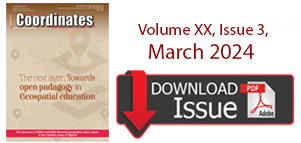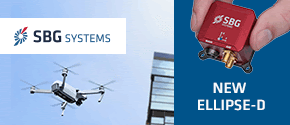| His Coordinates | |
“Initial Services are the first step towards full operational capability of Galileo in 2020”
 |
|
Congratulations for launching "Galileo Initial Services”. Please explain what it is all about?
The Initial Services are the services offered by the Galileo satellite navigation system which became operational in December 2016: Open Service, Public Regulated Service and Search and Rescue Service. These services are provided according to pre-defined performances based on the availability of 9 satellites, although we will have in operation 18 satellites in a few months’ time.
It is the first step toward full operational capability of Galileo in 2020. The Galileo Services will gradually improve as more satellites and the remainder of the ground segment will be deployed. Other services (e.g. commercial service) will be made available.
What is the current status and future plans of Galileo?
18 satellites have been launched to date. The last four, launched in November 2016 are still in their commissioning phase – i.e. they are being thoroughly tested – and they should join the constellation before the middle of 2017.
The build-up will continue to have the system fully operational in 2020.
What advantages Galileo offers to users compare to the other operational systems?
Galileo is Europe’s own Satellite navigation system. It guarantees Europe’s independence in this field but also encourage as well as maintain Europe’s technological know-how. It’s Open Service is fully interoperable with GPS. Galileo will also provide high quality positioning on its own. The quality of Galileo is better than the current GPS constellation, but of course our US colleagues can be expected to catch up with GPS-3
What are the anticipated technology changes anticipated in the GNSS in general, Galileo/ EGNOS in particular?
At the moment, GNSS in general is coping with an unprecedented increase in use and the development of many new markets of satellite navigation and timing. As there will soon be 4 systems available world-wide, one element is of course the combined use of the systems, in addition to each specific use. Individually, each system is studying where markets are going, what demands will be made on the systems on the future, and what technology improvements can deliver on these demands.
What is the assessment on the utilisation of EGNOS both for aviation and non-aviation sectors? Is there any costbenefit analysis available?
In March 2017, Eurocontrol registered 308 approach procedures in 187 airports all over Europe supported by EGNOS. We see at the moment a very strong interest in the maritime and railways sectors and we expect to see significant growth in all areas.
Has there been any mandate from the Government for the utilisation for EGNOS?
As far as we are aware, EGNOS is a service to be used as countries and users see fit and each country decides its own utilisation strategy. In part this has to do with the investment strategy in legacy infrastructure. For example, there is an increasing number of countries considering to stop investing in ILS installations (terrestrial Instrument Landing Systems, notably at smaller airport) and replace it with EGNOS landing procedures.
What are the plans for the expansion of EGNOS beyond the European Civil Aviation Conference (ECAC) regions?
EGNOS is foreseen as a service over Europe whereby a number of smaller extensions are still foreseen. Use of the underlying European technology is indeed happening in other parts of the world, e.g in Korea, but this is the result of public procurements to which the European technology suppliers react. We are of course hoping that, following Korea, there will be other that will follow.
What are the plans for moving towards Dual Frequency Multi Constellation (DFMC)? When will it be realised ?
European Space Agency (ESA) has been delegated by the European GNSS Agency (GSA) the procurement of EGNOS V3 which will contain DFMC features. However, this will be passed to the GSA for operational qualification and certification which dictates the date of service availability.
What are the efforts taken to work with other navigation satellites stake-holders to bring in synergy in the utilisation?
Regulars meetings are held with representatives of existing and foreseen SBAS systems around the world in order to harmonise the various systems in order to offer a harmonised service around the world.
With the reported atomic clock failures observed onorbit, what are the plans for the realisation of Galileo?
The malfunctions are limited and do not affect the navigation signals coming from the satellites as we have more than enough redundancy on board. So the satellites are fully operational and Initial Services are not affected. Of course we are currently initiating actions on the clocks that are on board satellites still on the ground. So the completion of the constellation is continuing.
Are the problems noticed in Galileo clocks similar to the ones observed by other navigation space operators? Is the cause clearly identified?
The cause is under investigation but the tests and investigations are not yet fully completed.
Recently the issues related to interference/ jamming/spoofing are widely discussed. Given the dependence on GNSS on our day to day life, how important is it to develop the ‘GNSS backup Systems’?
It is important, so therefore everybody is happy that there are a number of global systems. However, satellite navigation alone will not be providing a complete solution and further integration with terrestrial navigation and inertial systems and sensors is important, as well as integration with communication and other means. We can mention e.g. that certain sectors need navigation means in tunnels, cities, and other geographical specific areas. Moreover, autonomous driving, currently foreseen to commence in the next decades, can only work if there is such an integration with other space and terrestrial means and sensors. The same is true for 5G developments.
Do you see any implication of Brexit on Galileo?
There are likely to be implications although it is difficult to say what they will be as it depends to a large extend on the Brexit negotiations.











 (No Ratings Yet)
(No Ratings Yet)




Leave your response!